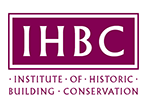
The mark of the conservation professional
Continuing Professional Development (CPD)
A professional body is defined by the skills of its membership, and by how that expertise develops. To ensure that we keep our skills up to date, the IHBC currently requires its members to undertake a minimum of fifty hours of relevent professional development over a rolling two year period.
From 1st April 2005 we introduced the forms downloadable below for recording and monitoring continued professional development (CPD). Contact our Director Dr Sean O'Reilly director@ihbc.org.uk with queries, or Lydia Porter admin@ihbc.org.uk for extra forms.
Downloads
Guidance Notes (PDF)
CPD form (PDF)
CPD form (MS Word)
CPD form (MS Excel)
Reviewing and Assessing CPD - IHBC Council 28th May 2009
PDF download
MS Word download
For hard copies of CPD forms contact Lydia Porter at admin@ihbc.org.uk
An example of a completed CPD form.
PDF download
Planning your Professional Development
From an article by Mike Brown and John Preston for the IHBC 2005 Yearbook
A key part of any Institute’s activity is to ensure that its members develop and update their professional competences. It is equally important that members and their employers recognise this need. Members are admitted on the basis that they have adequate training in their chosen field; they are required to maintain their professional competence throughout their working lives under the Institute’s Code of Conduct.
The IHBC, in common with other professional bodies, recognises the value to be gained by members, clients, our heritage and the public at large in having a positive approach to the continuing training and development of its members. Many members will have already qualified in some capacity in another profession before specialising in conservation work. This too will have often been the basis for formal study. Once in the world of work, however, members’ training and education needs are just as important as when they were students but can take on a much more varied and informal form. The Institute, at national and branch level together with many partners already delivers a wide range of training opportunities. However, the requirement to keep abreast of new and current developments and thinking, in a broad and diverse profession, is never-ending and members will be engaged in this effort on a daily basis.
To this end, IHBC has had an interim CPD (Continuing Professional Development) requirement for each member to undertake 50 hours of CPD over any 2-year period. However, and as other Institutes have found, such simple recording of CPD on a time basis gives no indication of the quality of the training, or of what the member has gained from it.
Following consultation, the Institute has now formally agreed a new CPD regime which is being introduced for the 2005-6 financial year. The requirement for 50 hours’ CPD to be completed in any 2-year period continues; the major change is the introduction of a CPD return which requires each member to plan his or her own training needs on the basis of a Personal Development Assessment related to the Institute’s Areas of Competence.
IHBC recognises that many of its members have to meet the CPD requirements of other Institutes. CPD completed to meet the requirements of another Institute will continue to be eligible for “double-counting” for IHBC also, provided that it relates to the IHBC’s Areas of Competence and meets needs identified in the Personal Development Assessment.
What is CPD?
Many IHBC members will be familiar with Continuing Professional Development, or CPD, through their membership of other professional bodies. It is a method of encouraging individual reflection of what your particular, personal professional development needs are, where you intend to find them, what you have learnt from the experience and then feeding that back into the personal reflection process. At its best it can deliver a virtuous upwards spiral of increasing positive self awareness, self-confidence and professional improvement and success. The written record is simply evidence of this journey.
What counts as CPD?
When CPD was first introduced by other professional bodies, many imagined that it was restricted to attending seminars, lectures and similar formal training events. It was soon realised that this approach did not meet many members’ needs. Yet, this narrow approach still informs many professionals’ response to CPD. The IHBC encourages its members to take a much more imaginative approach to addressing how to meet their professional development requirements. The Institute recognises that, ultimately, it will be down to the individual member, from their assessment stage, to work out what best suits them.
Formal training may play a part in meeting your Personal Professional Development needs and the Institute hopes that its national and branch level events will be what you are looking for. If not, or you have a suggested topic for an event please don’t hesitate to contact your IHBC branch or the Education Secretary, and let them know. But other sources of information and knowledge should be considered. Going to site and watching a craftsman scarf in a difficult timber frame repair might count if you are striving to improve your knowledge in that area. Similarly, the closely argued legal point at a Public Inquiry, the analysis of a client’s financial submission for enabling development or the philosophical debate with your peers as to whether a proposed extension should match or be distinctly modern are all areas which can all count, if they take you into new professional territory or explore ideas to a new level.
What matters is not the form but the content, and that it links back to your Personal Development Assessment and the IHBC’s Areas of Professional Competence. CPD can be almost anything, so use your imagination.
What should happen as you progress over the year and years is that you start to get a feel for what your strengths and weaknesses are and how to go about building up your professional abilities and competencies so that you become a consummate and self confident professional, better able to take a leading role in the conservation world.
What happens next?
You must take care to keep your CPD records and verifying evidence safe! It is probably best to keep them in a hard copy file at home (people change jobs and lose records kept at work - particularly on the work computer). The IHBC will, at short notice, call in the CPD Records of a percentage of members each year for assessment. These members will be selected at random but the system will be attenuated to ensure, over time, that all members will, at some point, be called in. Any member who fails to submit their CPD Records or submits unacceptable and/or unverified CPD records will be subject to disciplinary action by the Institute.
However, the Institute is confident that members will understand and recognise that CPD is primarily for the benefit of the individual members. That is why it has given responsibility for its effective implementation to each individual member. Hence, why it encourages a flexible, imaginative approach. Formal and informal learning both have a place in the IHBC’s CPD. Ultimately your CPD is a matter for your individual judgement. All the Institute asks is that you apply it honestly and effectively and that you meet the hours criteria.
The Institute knows the strength and diversity of its members and is proud of the work we all do to preserve and sympathetically exploit the heritage. It trusts you will use the opportunity CPD offers to grow and show the world just how good you and the IHBC really are.
Mike Brown and John Preston

